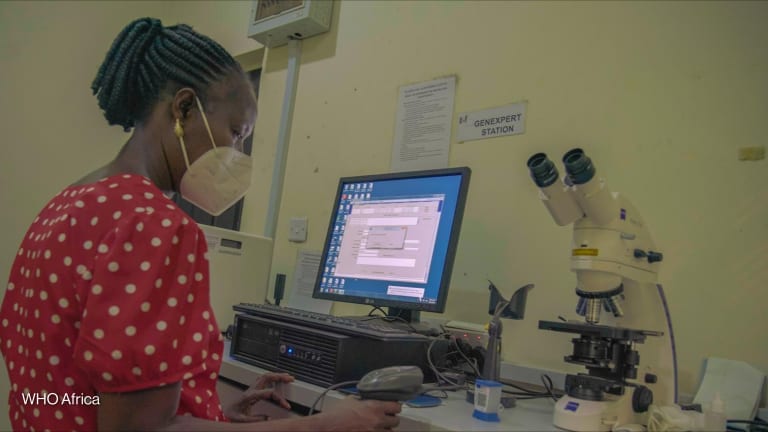
ACCRA, Ghana — Malaria is one of the leading causes of illness and death in Ghana, and a major reason for absenteeism from schools and work. The country is striving to become the first to pre-eliminate the disease — defined by the WHO as the point where less than 5 percent of suspected cases are diagnosed as malaria — in West Africa. But dwindling donor funds resulting from its achievement of middle-income status means it must quickly come up with alternative sources of financing.
In 2015, malaria accounted for around 38 percent of outpatient visits and 27.3 percent of admissions in health facilities in Ghana, as well as nearly half of under-5 deaths. In addition, businesses lost over $6.58 million to the disease in 2014.
All of Ghana’s estimated 28 million inhabitants are at risk of malaria, and the country recorded 4.8 million confirmed cases last year, according to national health authorities.
“The private and the public sector must recognize they are both needed to tackle malaria.”
— Keziah Malm, manager of Ghana’s National Malaria Control ProgrammeIn response, and as part of broader efforts to mobilize domestic funds for the health sector, Ghana is increasingly turning to public-private partnerships, including with firms from the mining, energy, pharmaceutical, and telecommunication sectors.
Devex caught up with Keziah Malm, manager of Ghana’s National Malaria Control Programme, on the sidelines of an insecticide launch in Accra. Malm offered insights into their strategies for engaging corporate Ghana in malaria control and explained how innovative PPPs can turbocharge the fight against the disease in Ghana and elsewhere.
The conversation has been edited for length and clarity.
One of the goals of the NMCP is to increase private sector contribution to malaria control, especially as part of efforts to mobilize domestic resources. What strategies are you using to you make the investment case to corporate Ghana?
There is a need to sustainably mobilize domestic funding, both to maintain and increase the gains in malaria control, so there is a lot of continuous engagement through different platforms to get the private sector to contribute. Alongside our partners, for example, we document the impact of malaria on the private sector, so that we can persuade it to join control efforts.
The NMCP’s Resource Mobilization Unit also facilitated the creation of the Ghana Malaria Foundation, a private sector-led entity aimed at raising domestic funds for prevention, treatment, and research. Through this foundation, companies engaged in malaria control such as AngloGold Ashanti [supported by The Global Fund to Fight AIDS, Tuberculosis and Malaria, and Unitaid] can share their experience with firms that are not yet on board.
Leaders challenge Commonwealth countries to halve malaria cases by 2023
The announcement comes during the Malaria Summit London 2018, where commitments will include a range of new interventions in funding, innovation, and data, with strong support from malaria-endemic countries and a special focus on refugees and internally displaced people.
Additionally, we are working with the Private Sector Malaria Prevention project [a three-year initiative funded by DFID and operated by the John Hopkins Center for Communication Programs]. The aim is to get companies to appreciate the impact of malaria on their workforce so that they invest in malaria prevention programs.
Getting the private sector to contribute up to 20 percent of the national gap for malaria financing is one of the strategic priorities of the NMCP. How big is this gap, and how much progress has been made toward filling it?
The NMCP's 2014-2020 National Strategic Plan faces a gap of around $320 million. We have made progress in terms of getting private sector companies to buy nets for their operational areas, but we still have a long way to go to fill the funding gap.
The NMCP is partnering with Agamal, the malaria control program of AngloGold Ashanti, which is the third-largest gold mining company in the world in terms of production. What makes this public-private partnership innovative, and how does it offer a model that could be replicated elsewhere?
An innovative aspect is that, when we apply to the Global Fund grants, we send a single application as a country. That includes both public interventions and Agamal’s indoor residual spraying program [also known as IRS — based on seasonally applying long-lasting insecticides to the walls of dwellings].
Our partnership with Agamal is a model that we use all the time in our advocacy platforms to inspire other private sector actors in Ghana and even other countries.
We believe in it because we have seen its impact: Malaria cases recorded by the private health facility in Obuasi have dropped to about 100 cases a month from over 6,000 at the outset of the program in 2006. We make the case for the continuation of IRS, irrespective of who does it, and Agamal has shown it can do it well.
What are the key barriers to private-sector engagement in malaria control and how is Ghana addressing them?
There is a lot of discussion on how to incentivize private-sector engagement, and here is where our political leaders come in.
At the Commonwealth Summit in London earlier this year, Ghana’s President Nana Akufo-Addo committed to stepping up the fight against malaria. We believe this is an indication that more can be done to bring the private sector on board, but those things are under discussion. What we have to be able to do is show the private sector it can benefit by investing in the fight against malaria.
Ghana has engaged in health sector PPPs with various telecom companies. Are you considering harnessing telemedicine and big data for malaria control?
We are already working with some telecommunications companies, but we continue to look for platforms we can collaborate with. On World Malaria Day, for instance, we partnered with Vodafone and MTN to disseminate health messages on how to prevent the disease and on what to do if one falls ill.
Another example of collaboration is this year’s campaign for the mass distribution of nets. For the first time, and with support from the private sector, we have transitioned from manual to digital registration processes based on the use of tablets.
“Our partnership with Agamal is a model that we use all the time in our advocacy platforms to inspire other private sector actors in Ghana and even other countries. We believe in it because we have seen its impact.”
—What are the keys to successful PPPs in malaria control?
First of all, the private and the public sector must recognize they are both needed to tackle malaria. Then, we have to identify who is better at doing what and set very clear rules. At that point, we must encourage each other to play our respective roles within the confines of what is feasible. That is how I believe we will win the fight against malaria.
What progress would you like to see in the next five years, both in terms of health outcomes and PPPs for malaria control?
Our strategic plan aims to reduce malaria deaths and cases by 75 percent by 2020. We have already achieved the first target and we are now working toward zero deaths. In the next five years, our goal is that nobody dies from malaria in the country and that the disease burden is drastically reduced.
In terms of PPPs, we aim to collaborate more closely with the private sector, and we want it to see malaria as what it is: A critical health problem that must be solved for us to get — as evidence shows — social and economic benefits.
Without malaria, people are able to work and children can go to school and learn at the pace they are meant to learn. It is clear this affects our future as well.
Devex, with financial support from our partner MSD for Mothers, is exploring how the private sector is driving innovations in global health. Visit the Focus on: Future of Health Partnerships page for more.








